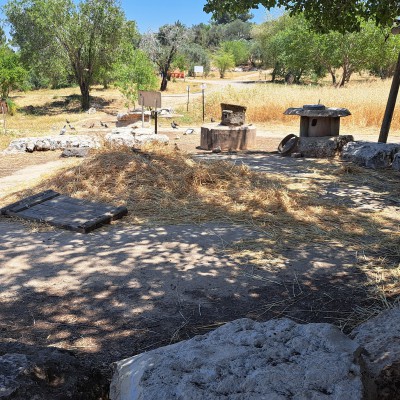Watch
Events
Articles
Market
More
#itisaverygoodland
Indeed it is!
At Park Neot Kedumim
https://www.neot-kedumim.org.i




#itisaverygoodland
Indeed it is!
At Park Neot Kedumim
https://www.neot-kedumim.org.i




#itisaverygoodland
Indeed it is!
At Park Neot Kedumim
https://www.neot-kedumim.org.i




 +4
+4



1 Peter 3:15, “But in your hearts sanctify Christ as Lord. Always be prepared to give a defense to everyone who asks you the reason for the hope that is in you. But respond with gentleness and respect,” During a training session I had many years ago I was taught when in an emergency situation always remember to “STOP, THINK and GET CONTROL. This can also apply to the way re respond to other during an important conversation. before we answer we should first stop and think so we are able to get control over our tongue before we speak.



35 NAMES, TITLES AND NATURE OF YHVH
PART 2
19) EL-HANNORA -- THE AWESOME YHVH
“Now therefore, our YHVH, the Great, the Mighty, and the Terrible YHVH, who keepest Covenant and Mercy, let not all the trouble seem little before thee, that hath come upon us, on our kings, on our princes, and on our priests, and on our prophets, and on our fathers, and on all thy people, since the time of the kings of Assyria unto this day.” (NEHEMIAH 9:32)
20) EL-ROHI -- MY SHEPHERD
“Adonai is my Shepherd; I shall not want.” (PSALM 23:1)
21) EL-HAKKAVOD -- THE YHVH OF GLORY
“The voice of Adonai is upon the waters: the YHVH of Glory thundereth: Adonai is upon many waters.” (PSALM 29:3)
22) EL-EMET -- THE YHVH OF TRUTH
“Into Thine Hand I commit my spirit: thou hast redeemed me, O Adonai, YHVH of Truth.” (PSALM 31:5)
23) EL-CHAIYAI -- THE YHVH OF MY LIFE
“Yet Adonai will Command His Lovingkindness in the daytime, and in the night His Song shall be with me, and my prayer unto the YHVH of my life.” (PSALM 42:8)
24) EL-SALI -- MY STRENGTH
“I will say unto YHVH my Rock, why hast Thou forgotten me? Why go I mourning because of the oppression of the enemy?” (PSALM 42:9) ***
25) EL-YISRAEL -- THE YHVH OF YISRAEL
“O YHVH, Thou art Terrible out of Thy holy places: the YHVH of Yisrael is He that giveth strength and power unto His people. Blessed be YHVH.” (PSALM 68:35)
26) EL-HASHAMAYIM -- THE YHVH OF HEAVENS
“O give thanks unto the YHVH of Heaven: for His Mercy endureth for ever.” (PSALM 136:26)
27) EL-TSIDKENU -- MY RIGHTEOUSNESS
“Behold, the days come, saith Adonai, that I will raise unto David a righteous Branch, and a King shall reign and prosper, and shall execute judgment and justice in the earth. In His days Judah shall be saved, and Yisrael shall dwell safely: and this is His Name whereby He shall be called, ADONAI, OUR RIGHTEOUSNESS.” (JEREMIAH 23:5, 6)
28) EL-SHAMMAH -- ADONAI IS THERE
“It was round about eighteen thousand measures: and the name of the city from that day shall be, Adonai is there.” (EZEKIEL 48:35)
29) EL-HAKKADOSH -- THE HOLY YHVH
“But Adonai of hosts shall be exalted in judgment, and YHVH that is Holy shall be sanctified in righteousness.” (ISAIAH 5:16)
30) EL-IMMANUEL -- THE YHVH WITH US
“Therefore, Adonai Himself shall give you a sign; behold, a virgin shall conceive, and bear a son, and shall call His Name Immanuel.” (ISAIAH 7:14)
31) EL-GIBBOR -- THE MIGHTY YHVH
“For unto us a Child is born, unto us a Son is given: and the Government shall be upon His shoulder: and His Name shall be called Wonderful, Counsellor, the Mighty YHVH, the Everlasting Father, the Prince of Peace.” (ISAIAH 9:6)
32) EL-YESHUATI -- MY SALVATION
“Behold, YHVH is my Salvation; I will trust, and not be afraid: for Adonai YHVH is my Strength and my Song; He also is become my Salvation.” (ISAIAH 12:2)
33) EL-TZADDIK -- THE RIGHTEOUS YHVH
“Tell ye, and bring them near; yea, let them take counsel together: who hath declared this from ancient time? Who hath told it from that time? Have not I Adonai? And there is no YHVH else beside Me; a just YHVH and a Saviour; there is none beside Me.” (ISAIAH 45:21)
34) EL-ECHAD -- THE ONE YHVH
“Have we not all one father? Hath not one YHVH created us? Why do we deal treacherously every man against his brother, by profaning the Covenant of our fathers?” (MALACHI 2:10)
35) EL-HA’SAVLANUT VE’HA’NECHAMAH -- THE YHVH OF PATIENCE AND CONSOLATION
“Now the YHVH of Patience and Consolation grant you to be likeminded one toward another according to Yeshua Moshiach” (ROMANS 15:5)



35 NAMES, TITLES AND NATURE OF YHVH
PART 1
EL – This Name of YHVH means Might, Strength and Power and appears over 250 times in the Tanakh. Appears primarily in the construct relation when describing the YHVH of Yisrael.
1) YHVH -- I AM
“And YHVH said unto Moses, I AM THAT I AM: and He said, thus shalt thou say unto the children of Israel, I AM hath sent me unto you.” (EXODUS 3:14)
2) EL-ELOHIYM -- CREATOR
“In the beginning YHVH created the heaven and the earth.” (GENESIS 1:1)
3) EL-ABBA -- FATHER
“And Adonai YHVH formed man of the dust of the ground, and breathed into his nostrils the breath of life; and man became a living soul.” (GENESIS 2:7)
4) EL-ELYON -- MOST-HIGH
“And blessed be the Most-High YHVH, which hath delivered thine enemies into thy hand. And He gave him tithes of all.” (GENESIS 14:20) // “he hath said, which heard the Words of YHVH, and knew the knowledge of the Most-High, which saw the vision of the Almighty, falling into a trance, but having his eyes open” (NUMBERS 24:16) // “I will be glad and rejoice in Thee: I will sing praise to Thy Name, O Thou Most-High.” (PSALM 9:2)
5) EL-SHADDAI -- MY SUPPLY
“As for Me, behold, My Covenant is with thee, and thou shalt be a father of many nations.” (GENESIS 17:4)
6) EL-ADONAI -- MY LORD / MY MASTER
“And said, my Lord, if now I have found favour in Thy sight, pass not away, I pray Thee, from Thy servant:” (GENESIS 18:3)
7) EL-OLAM -- EVERLASTING
“And Abraham planted a grove in Beer-Sheba, and called there on the Name of Adonai, the Everlasting God.” (GENESIS 21:33) // “Adonai, Thou hast been our dwelling place in all generations. Before the mountains were brought forth, or ever Thou hadst formed the earth and the world, even from everlasting to everlasting, Thou art YHVH. Thou turnest man to destruction; and sayest, return, ye children of men.” (PSALM 90:1-3) // “Thy Throne is established of old: Thou art from Everlasting.” (PSALM 93:2) // “Trust ye in Adonai for ever: for in Adonai YHVH is Everlasting strength” (ISAIAH 26:4)
8) EL-YIREH -- MY PROVIDER
“And Abraham said, my son, YHVH will provide Himself a lamb for a burnt offering: so they went both of them together.” (GENESIS 22:8)
9) EL-ROPHE -- MY HEALER
“And said, if thou wilt diligently hearken to the voice of Adonai thy YHVH, and wilt do that which is right in His sight, and wilt give ear to His Commandments, and keep all His Statutes, I will put none of these diseases upon thee, which I have brought upon the Egyptians: for I am Adonai that healeth thee.” (EXODUS 15:26)
10) EL-NISSI -- MY VICTORY
“And Moses built an altar, and called the Name of it YHVH-Nissi” (EXODUS 17:15)
11) EL-KANNA -- THE JEALOUS YHVH
“Thou shalt not bow down thyself to them, nor serve them: for I Adonai thy YHVH am a Jealous YHVH, visiting the iniquity of the fathers upon the children unto the third and fourth generation of them that hate Me” (EXODUS 20:5) // “For thou shalt worship no other god: for Adonai, whose Name is Jealous, is a Jealous YHVH” (EXODUS 34:14)
12) EL-CHANNUN -- GRACIOUS ONE
“And Adonai passed by before him, and proclaimed, Adonai, Adonai YHVH, Merciful and Gracious, Longsuffering, and abundant in goodness and truth” (EXODUS 34:6) // “And he prayed unto Adonai, and said, I pray Thee, O YHVH, was not this my saying, when I was yet in my country? Therefore, I fled before unto Tarshish: for I knew that Thou art a Gracious YHVH, and Merciful, slow to anger, and of great kindness, and repentest Thee of the evil.” (JONAH 4:2)
13) EL-M’KADDESH -- MY SANCTIFIER
“Sanctify yourselves therefore, and be ye holy: for I am Adonai your YHVH. And ye shall keep My Statutes, and do them: I am Adonai which Sanctify you.” (LEVITICUS 20:7, 8)
14) EL-RACHUM -- THE YHVH OF COMPASSION
“For Adonai thy YHVH is a merciful YHVH; He will not forsake thee, neither destroy thee, nor forget the Covenant of thy fathers which He sware unto them.” (DEUTERONOMY 4:31)
15) EL-HANNE’EMAN -- THE FAITHFUL YHVH
“Know therefore that Adonai thy YHVH, He is YHVH, the Faithful YHVH, which keepeth Covenant and Mercy with them that love Him and keep His Commandments to a thousand generations” (DEUTERONOMY 7:9)
16) EL-HAGGADOL -- THE GREAT YHVH
“For Adonai your YHVH is YHVH of gods, and Adonai of lords, a Great YHVH, a Mighty, and a Terrible, which regardeth not persons, nor taketh reward” (DEUTERONOMY 10:17)
17) EL-SHALOM -- MY PEACE
“Then Gideon built an altar there unto Adonai, and called it YHVH-Shalom: unto this day it is yet in Ophrah of the Abiezrites.” (JUDGES 6:24)
18) EL-DE’OT -- THE YHVH OF KNOWLEDGE
“Talk no more so exceedingly proudly; let not arrogancy come out of your mouth: for Adonai is a YHVH of Knowledge, and by Him actions are weighed.” (1 SAMUEL 2:3)






Thought for Today: Sunday May 11
Allow YHVH’s Love to seep into the inner recesses of your being. Do not close off any part of yourself from Him. He knows you inside-out, so, do not try to present a “cleaned-up” of yourself to Him. Wounds that you shut away from the Light of His Love, will fester and become wormy. Secret sins that you hide from Him can split off and develop lives of their own, controlling you without realizing it. Remember, His Love-Light search out and destroys hidden fears.


